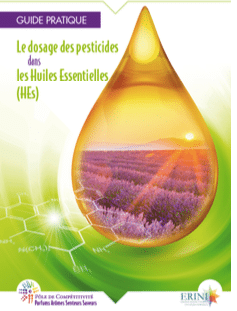Pesticides are still a hot topic. For the PASS Competitiveness Cluster, this is a major topic addressed since 2015 via a collective action carried out with 11 companies in the aromatic and cosmetics industry. Multi-residue pesticide analysis methods are widely described in the literature and well mastered by analytical laboratories for matrices such as water and fruit and vegetables. This is not the case for essential oils, whose analysis represents a complex challenge. That's why the PASS Pole has produced a practical guide to the determination of pesticides in essential oils, to help you get to grips with all the subtleties involved.
A practical guide to dosing pesticides in essential oils
This guide is the result of the first pesticides collective action carried out between 2015 and 2017. It is the result of the scientific expertise of 11 companies in key sectors of the value chain. It brings together the information essential for deciphering the analysis bulletin and interpreting the results, to help companies improve their understanding of the pesticide issue and their possible presence in extracts.
This guide is available to companies free of charge, on request from Pôle PASS.
The PASS cluster pursues its commitments
On the strength of its first edition, the PASS Competitiveness Cluster, supported by the French government and the Provence Alpes Côte d'Azur Regional Council, is launching a new collective action, starting in September 2017.
This collective action is aimed at companies in the sector who wish to make a commitment to guaranteeing safe, environmentally-friendly products. It targets companies looking for tools and arguments on the issue of pesticides to support their approach to all stakeholders.
This second action will enable us to assess the nature and extent of pesticide contamination in the different types of natural extracts on the market.
Its aim is to carry out a sanitary analysis of a sector (to be defined) at the level of the main production basins.
It aims to provide a methodological framework, an analysis tool and an electronic application combining a pesticide database.




